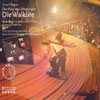Wagner (Die) Walküre
Round two of this rejuvenated Wagner finds the Dutch well ahead on points
View record and artist detailsRecord and Artist Details
Composer or Director: Richard Wagner
Genre:
Opera
Label: Etcetera
Magazine Review Date: 4/2007
Media Format: Super Audio CD
Media Runtime: 219
Mastering:
Stereo
DDD
Catalogue Number: KTC5501

Tracks:
| Composition | Artist Credit |
|---|---|
| (Der) Ring des Nibelungen: Part 2, '(Die) Walküre' |
Richard Wagner, Composer
Albert Dohmen, Wotan, Baritone Charlotte Margiono, Sieglinde, Soprano Doris Soffel, Fricka, Mezzo soprano Dorothy Grandia, Gerhilde, Soprano Ellen van Haaren, Ortlinde, Soprano Hartmut Haenchen, Conductor Hebe Dijkstra, Schwertleite, Contralto (Female alto) Irene Pieters, Siegrune, Mezzo soprano John Keyes, Siegmund, Tenor Kurt Rydl, Hunding, Bass Linda Watson, Brünnhilde, Soprano Marina Prudenskaja, Grimgerde, Mezzo soprano Natascha Petrinsky, Waltraute, Mezzo soprano Netherlands Philharmonic Orchestra Qiu Lin Zhang, Rossweiße, Mezzo soprano Richard Wagner, Composer Turid Karlsen, Helmwige, Soprano |
Author: Mike Ashman
They manage things well in Amsterdam. After DVDs from the first round of the Pierre Audi/ Georges Tsypin production, now come SACDs from the 2005 revival – by which time conductor Haenchen and his orchestra(s) were well worked into the New Wagner Edition score. It’s not a case of the notes being different or unfamiliar but how they’re used. Tempi, dynamics and incorporated style suggestions (from rehearsal notes taken verbatim in Bayreuth by Wagner’s young conducting assistants) lend the score a rejuvenating lightness and bounce, making it a full contemporary of Berlioz and Liszt, and an even clearer heir to Weber and (don’t tell Wagner) Mendelssohn.
Sample immediately the Valkyrie scene itself at the beginning of Act 3; it runs throughout at a spanking allegro, eschews all the late-19th/early-20th-century slowings and stoppings still heard today (for example, chez Christian Thielemann at Bayreuth last summer), and yet is as punchy and thrilling as Goodall’s old ENO performance (Chandos, 12/00) with its line-up of four future Brünnhildes. Furthermore, the linking instrumental recitatives in which Siegmund and Sieglinde find each other, or which accompany Wotan’s resignation or anger, are not integrated smoothly by Haenchen into one big seamless, Romantic fabric – as they are by, say, Furtwängler in his EMI studio recording recently returned by Naxos. Nor are they inevitably weighty and loud. Throughout, Haenchen’s experience with earlier music is put to telling effect. The forward woodwind balance, the subtle use of the heavier brass, and an evidently careful selection of timpani sticks all make this sound like Die Walküre on period instruments.
Key roles have been recast since the DVDs were filmed. Watson and Margiono can both be compelling stage personalities (Margiono too has experience in the early Romantic repertoire back to which Haenchen’s Wagner sound world harks). Here it sounds sometimes as if heeding Wagner’s request for “an impersonal narrative style” has led to an efficient emotional neutrality. More engaged are the veterans Rydl (really evil) and Doris Soffel (a Fricka over the edge). Dohmen’s Wotan, decidedly a baritone, has much of Thomas Stewart’s grace and elegance and some of Fischer-Dieskau’s mastery of text in the role. And John Keyes’s virile, baritonal Siegmund is simply the Rolls Royce cast of the day.
The recording is very alive; sudden changes of focus and balance clearly reflect the all-enveloping physical geography of the staging. It never distracts from the importance of a major new look at Wagner’s score.
Sample immediately the Valkyrie scene itself at the beginning of Act 3; it runs throughout at a spanking allegro, eschews all the late-19th/early-20th-century slowings and stoppings still heard today (for example, chez Christian Thielemann at Bayreuth last summer), and yet is as punchy and thrilling as Goodall’s old ENO performance (Chandos, 12/00) with its line-up of four future Brünnhildes. Furthermore, the linking instrumental recitatives in which Siegmund and Sieglinde find each other, or which accompany Wotan’s resignation or anger, are not integrated smoothly by Haenchen into one big seamless, Romantic fabric – as they are by, say, Furtwängler in his EMI studio recording recently returned by Naxos. Nor are they inevitably weighty and loud. Throughout, Haenchen’s experience with earlier music is put to telling effect. The forward woodwind balance, the subtle use of the heavier brass, and an evidently careful selection of timpani sticks all make this sound like Die Walküre on period instruments.
Key roles have been recast since the DVDs were filmed. Watson and Margiono can both be compelling stage personalities (Margiono too has experience in the early Romantic repertoire back to which Haenchen’s Wagner sound world harks). Here it sounds sometimes as if heeding Wagner’s request for “an impersonal narrative style” has led to an efficient emotional neutrality. More engaged are the veterans Rydl (really evil) and Doris Soffel (a Fricka over the edge). Dohmen’s Wotan, decidedly a baritone, has much of Thomas Stewart’s grace and elegance and some of Fischer-Dieskau’s mastery of text in the role. And John Keyes’s virile, baritonal Siegmund is simply the Rolls Royce cast of the day.
The recording is very alive; sudden changes of focus and balance clearly reflect the all-enveloping physical geography of the staging. It never distracts from the importance of a major new look at Wagner’s score.
Discover the world's largest classical music catalogue with Presto Music.

Gramophone Digital Club
- Digital Edition
- Digital Archive
- Reviews Database
- Full website access
From £8.75 / month
Subscribe
Gramophone Full Club
- Print Edition
- Digital Edition
- Digital Archive
- Reviews Database
- Full website access
From £11.00 / month
Subscribe
If you are a library, university or other organisation that would be interested in an institutional subscription to Gramophone please click here for further information.




